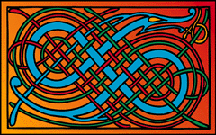|
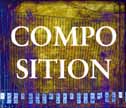

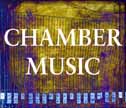
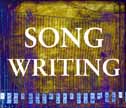

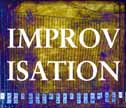



|

The two pieces below were created to contribute to the online Frame Drummer Group compilation CD (to which I also contributed some artwork illustrations).
Frame drums are defined as drums wherein the depth of the shell is less than the radius of the drumhead. All tambourines, for example, are frame drums. Frame drums appear in all cultures and all eras around the world. They often have zills (jingles) attached around the shell, that rattle as one plays; the riq has five pairs of zills. Other frame drums, such as the bendir, have sinew snares on the back of the head, that rattle when one plays.
I highly recommend a visit to Layne Redmond's website. Layne's book, When the Drummers Were Women, is the definitive study to date on the history, culture, and spirituality of frame drumming. A truly revelatory book.
Kanjo
© copyright 2003 AD. All Rights Reserved.
Recorded at Dragon's Weyr Studio, St. Paul, MN,
December 31, 2002, thru January 3, 2003.
Arthur Durkee: Chapman Stick™, riq, bodhran, bendir, bells.
Duration: circa 7:30
Notes
"Kanjo" is a Japanese word from the medieval Shogunate era. "Kan"
means shield, and stands for soldiers. "Jo" means castle. The
soldiers are the shield that protects the castle. The soldiers
are the castle, in a sense. Without the people who are its living
defense, a castle is merely a collection of empty buildings.
The piece begins with a short, semi-chaotic introduction. The body of the piece is in a rhythmic structure of 5+7. Of the many ways to subdivide a 12-beat measure, this is one of my very favorite.
Rumi's Tambourine is a second, shorter piece submitted to the Frame Drummer's Group CD. The texts are fragments from Rumi, wherein the great Sufi ecstatic poet uses music as his frame of reference.
Rumi's Tambourine
© copyright 2003 AD. All Rights Reserved.
Recorded at Dragon's Weyr STudio, St. Paul, MN,
January 7 thru 10, 2003.
Arthur Durkee: bodhran, riq, Chapman Stick™, suling degung, Moog Prodigy synth.
Eddie Estrin: Roland Juno-60 synth.
Duration: circa 4:10
Texts from Rumi
"I am a tambourine. Don't put me aside
till the fast dancing starts.
Play me some all along.
Help me with these little sounds."
"Who is luckiest in this orchestra? The reed.
Its mouth touches your lips to learn music.
All reeds, sugarcane especially, think only
of this chance. They sway in the canebrakes,
free in the many ways they dance.
"Without you the instruments would die.
One sits close beside you. Another takes a long kiss.
The tambourine begs, Touch my skin so I can be myself."
—p. 94, The Essential Rumi, trans. by Coleman Barks, 1995.

|


